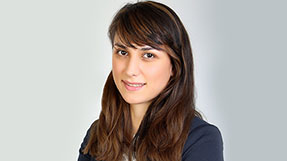
Aida
My Background
I had a sustainable job in chemical engineering in 2018, however, I had other ambitions such as a job in computer science. I wasn’t sure how I was going to get there despite having two degrees in chemical engineering from the University of Isfahan and four years of experience working in the field. After some research, I found out about the Khoury College Align graduate computer science program at Northeastern designed specifically for students without prior experience. I was worried about being accepted, but not only was I admitted into the program, but I also won a scholarship from Pivotal Ventures, a Melinda Gates-founded investment and startup. Although I liked my job as an engineer, it wasn’t as exciting as I had hoped. The Align program was useful and truly helped me change my career for the better.
Bridge
I had enough prior math and coding skills to comfortably navigate the classes in the first two semesters of the Align program, which is referred to as the bridge and is meant to expose students to the computer sciences. My strength and perseverance really came into play during my third semester when the content started to get more challenging. I would watch online tutorials, videos from professors and teaching assistants, and spend hours analyzing example problems. Before looking at the answers, it’s crucial to attempt all of the examples in the book and on the slides for yourself. Taking advantage of all the resources available to you is one piece of advice I would recommend to prospective students.
Research
I started to focus on research opportunities as I became familiar with the Align program. During my first graduate year in chemical engineering, I liked being a part of research and thought it was a crucial step towards fully understanding the ideas I was learning in class. I spoke with previous Dean Carla Brodley at a Khoury event, and she put me in touch with Professor Ricardo Baeza-Yates, who would later serve as my thesis advisor. I ended up studying CS 5800: Algorithms with him as well, and I eventually worked as the course’s teaching assistant.
I was instantly interested when Professor Ricardo Baeza-Yates proposed that I research the subject of measuring bias in machine learning. I saw working on this topic as a fantastic chance to fight social injustice as a feminist and someone who wants to challenge hierarchical categorization. The problem of bias or prejudice in artificial intelligence is a hot topic in the computer industry, and businesses like Microsoft and Google are grappling with this topic. For a number of reasons, machine learning models may be biased toward one or more particular groups of individuals. It could be present in the dataset used to train the model, in the way the algorithm favors a certain group, or in how users engage with the algorithm. Machine learning algorithms that are biased against particular populations, such as those employed in a credit scoring or resume screening, could have serious consequences.
The measurement of dataset bias was the main topic of my thesis. I did this by looking at real-world statistics, such as those on criminal recidivism or autism. Using statistical techniques, I calculated the bias against particular groups, such as women or people of color, and then combined the results into a single percentage figure. As opposed to using many values, this one single value may be used to compare the bias in various datasets more clearly.
My Future
When I left my chemical engineering job I had no idea that a few short years later, I would be enrolled at Northeastern University in San Francisco, would successfully defend my master’s thesis, and would have ambitions to work in the field of machine learning once I graduated. I finished my MS computer science thesis becoming the first Align student at Northeastern’s Bay Area campus to do so. I truly feel ready to start a job in computer science now that I’ve had these three years of preparation.
With my degree, I want to work as a machine learning engineer at a large corporation, but I also want to find employment that is ethically sound. I’m thinking about working at NASA, where I developed a deep-learning model to identify potentially hazardous abnormalities in flight data during my internship there last summer. I want to make sure that whatever I do next has a beneficial impact on the world.